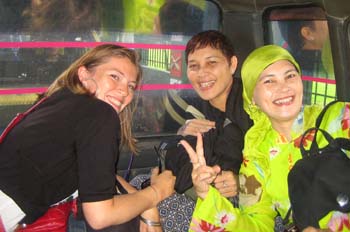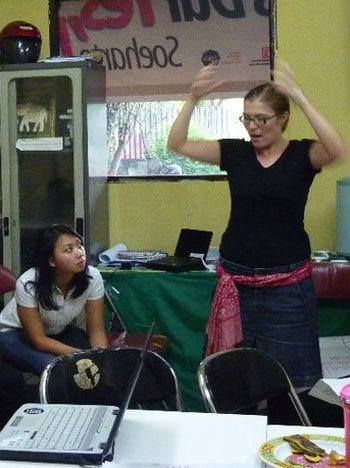Amis Boersma
Facilitating a workshop at KontraSTatiana Heinz |
It’s 2 December 2009, a week before a big anti-corruption demonstration in Jakarta and it is suddenly decided that KontraS – the Indonesian human rights organisation where I, an Indo-Dutch person, work as an advisor – will mobilise its network of victims and activists. A colleague moves a chalkboard to the terrace out front and a group of fifteen other colleagues gather around him. ‘Okay, what do we need to do for next week?’ asks the guy in charge. People randomly yell things which are jotted down on the board: call people to ask them to join the demonstration (the aim is that several hundreds will come), order food for everyone (a debate starts about how many boxes and how much these may cost), gather promotional materials, arrange transport and so on. I just arrived a month before and can’t help shaking my head thinking to myself they will never be able to pull this off.
A week later, I arrive at the Istiqlal mosque where the demonstrators have already gathered. Hundreds of people are neatly sitting in rows, while my colleague guides the groups arriving in the right direction by megaphone. At the right time the groups (all wearing the same shirts) walk in an orderly procession to the Presidential Palace, all this time assisted by the police. They’ve proven me wrong. And it wasn’t the last time. Just recently, Amnesty International's Secretary General visited the office. A few hours before his arrival, the office was a mess. But when he arrived, a buffet dinner awaited him in the back garden, which had miraculously been decorated with photos, paintings and lights. I was here as much to learn as I was to teach.
Insider-out
During the interviews for this job, I had not only argued that I knew about Planning, Monitoring and Evaluation (in short PME – NGO jargon for keeping an eye on the goals you set out to achieve, improving the way you work and proving you are moving toward your goals) and the way NGOs work, more importantly I had convincingly proven I understand Indonesian culture. Being half Indonesian and having studied Indonesia for about ten years, I argued that I would be able to help human rights organisation KontraS work more effectively. But do I actually understand Indonesian culture? Is there even such a thing?
An ‘insider-out’ is what anthropology calls a person that studies a group they belong to themselves. That’s what I was when I was writing my Masters thesis more than five years ago. I studied the third-generation Indo-Dutch who had organised themselves in the Netherlands and tried to understand and give meaning to their ethnic identity. I could identify with my Masters topic, but it seemed far removed from Indonesia. It was present-day Indonesia I was really interested in, ever since I first set foot there as a teenager.
At age fourteen I visited Indonesia for the first time. Just a few weeks before departure, my mum told me I had two sisters there. It was only then that I found out that my mother, as a teenager, had left her first two children in Indonesia with their father and grandmother. What a surprise to suddenly be united with two sisters I never knew I had! Upon arrival at Soekarno-Hatta airport, my eldest sister took my hand and introduced me to Jakarta’s heat. She looked exactly like my mum. Later that vacation, I fell ill with typhus and my other sister soothed me. Her English vocabulary was limited to ‘I love you’ and ‘Don’t cry’. That’s when I decided I wanted to learn to speak Indonesian fluently. Studying Indonesian Language and Culture at Leiden University felt like a natural choice. Also, I had always known I wanted to work in an international context, contributing to a better world.
For years I worked on Indonesia for Amnesty International and the Dutch NGO Free Voice, dreaming about actually helping ‘in the field’. So here I am, 17 years later, living and working in Jakarta.
Adjusting
KontraS is a renowned human rights organisation that deals with a wide range of people – from UN rapporteurs, ambassadors, international donors, politicians, the Indonesian police force to other NGOs, grassroots initiatives and often poor and uneducated victims of human rights violations. As an advisor on PME, I would help KontraS make it easier to keep track of all the work, learn from successes and mistakes, and most importantly tell all stakeholders about it. A walk in the park, I thought. But it turned out to be a lot harder than expected, because things are done very differently in Indonesia from what I was used to at my previous jobs in the Netherlands.
As the story about the demonstration illustrates, a lot is done rather impulsively in Indonesia – something which is quite far removed from Dutch reality. In the Netherlands we hardly ever spontaneously hang out with friends, let alone organise a big event just a week before. Perhaps planning seems futile in a place where always something unexpected happens. But it’s not only the unexpected that makes planning difficult. Planning implies many hidden obstacles. For example, it means that people have to communicate openly about when they will not be in the office, so they can make arrangements for the person who has to take on his or her tasks. In a culture where people are reluctant to burden others, people often decide not to say when they will be absent. Ultimately this leaves the colleagues with more (unplanned) work.
 |
With my two Indonesian sisters on a local busEefje de Kroon |
But I found out that not everything done differently is an obstacle. For example, unlike Dutch people, Indonesians prefer to avoid confrontation (something I’m also very good at). So when there’s a strategy meeting, people with opposing opinions hide their arguments under a thick layer of words. The subsequent speaker may in turn not even refer to the arguments presented before. Meetings go on like this for hours until at some point there (often) seems to be a consensus. When I first noticed this, I thought back of what I’d read about as a student of Indonesian culture: musyawarah dan mufakat! The tradition of making decisions collectively in order to reach consensus! It’s actually still done today; just keep on talking until we, as a group, all agree. Eventually, a decision is made without confrontation.
And there were more revelations. At an organisation staffed by very independent individuals I was surprised to find they also tend to avoid personal responsibility. When a deadline has passed, they are thus all to blame. I’ve been introduced to the phenomenon of ‘konsinyiering’, which means to hide away with a group of people to write a book or report. Each person writes an individual piece, all pieces are pasted together and with the text projected on the wall, then the full text is edited by the group. ‘Very inefficient’ was my first judgement. But then I learned that the work does get to be done that way, through group effort and consensus.
But there is one big issue that I still can’t fully grasp, which has haunted me since I started working at KontraS. For me time is linear, ordered in clear units which I can visualise and time is often in the future. Here I see that time is now and the future does not stretch beyond six months. Indonesians have a different concept of time – that it is flexible to the extent it is like rubber. The question for me is how to weave these two perceptions of time into a workable model, because in the world of International Development, where local NGOs like KontraS are funded by international donor organisations, quality is measured according to western standards and the western perception of time applies. At local NGOs, staff members seem to think they are the only ones having to adapt as they are on the receiving end of funding. My experience tells me that it doesn’t have to be that way. I encourage local NGOs to learn to explain to their donors what their work really looks like on a daily basis and create an evaluation model that reflects both perspectives of time.
The lack of planning may be challenging professionally, but in private life it is a blessing. Finally, free time! In the Netherlands my diary was full weeks in advance, in Indonesia I don’t use one. If I feel like hanging out with friends, I call them. If I’m tired and prefer to be alone, I’m not stuck with an appointment I made months before. It’s truly a revelation. Also, I now believe it’s actually possible to organise something on short notice.
A bit of both
Is living and working here easier for me because I have Indonesian roots? I’m not sure. I have lots of Dutch friends without Indonesian roots who seem to assimilate quite well, too, some maybe even better. Perhaps the fact that I’m part Indonesian myself makes it more difficult to adjust. I’m fighting something that also lives inside me, that I understand so well. Because I’m an insider I can be more critical and straight out say certain things. I can say the office looks like a mess and that people should be in time for meetings, without coming across as patronising. At the same time, there is no denying that I’m Dutch. I’m continuously reminded of that.
Recently, I facilitated a three-day training course for my colleagues. After two very successful days, I was truly over facilitating. When a discussion I tried to lead went completely out of hand as people began overruling each other’s turns to say something, I stormed out of the room. In the Netherlands this would have been a big thing – the group would have fallen silent and afterwards some people would have warily asked me if I was okay. But not here, they finished the discussion and made jokes about me being very cute when mad. This was truly an eye-opener. Just as it’s okay to laugh out loud (considered childish in the Netherlands), I have learned that it’s okay to be angry. Laughing at life is one of the things that I like about the Indonesian (NGO) way of doing things. In the Netherlands we’re often too serious. In the Netherlands, if we are late for the train, our day is ruined. In Indonesia, we just smile and wait for the next one.
Amis Boersma (amisboersma@gmail.com, http://amisboersma.blogspot.com) works as an advisor in planning, monitoring and evaluation at KontraS within the framework of ICCO’s Togetthere program.
This article is part of the Being 'Indo' miniseries
